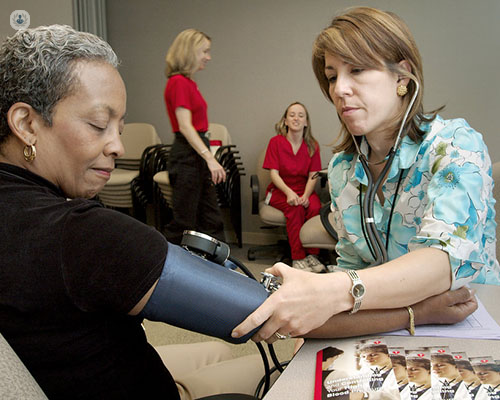What we need to know about hypertension
Escrito por:Hypertension, commonly known as high blood pressure, is a condition where the force of blood against artery walls remains persistently elevated, often leading to serious health problems such as heart disease and stroke. Blood pressure is measured by two readings: systolic (the top number), which measures pressure when the heart beats, and diastolic (the bottom number), which measures pressure when the heart rests between beats.
When these readings exceed the normal range—typically above 130/80 mmHg—it indicates hypertension. Many people may not experience symptoms initially, which is why hypertension is often referred to as a “silent killer.”

Types of hypertension
There are two primary types of hypertension: primary (essential) hypertension and secondary hypertension. Primary hypertension has no identifiable cause and typically develops over years, influenced by genetic, lifestyle, and environmental factors.
Secondary hypertension, less common, results from another underlying condition, such as kidney disease, endocrine disorders, or medication side effects. Factors that increase the risk of hypertension include obesity, excessive salt intake, smoking, sedentary lifestyle, chronic stress, and excessive alcohol consumption.
Management
Managing hypertension often begins with lifestyle changes. Reducing salt intake, incorporating regular physical activity, maintaining a healthy weight, and limiting alcohol consumption can significantly lower blood pressure.
A diet rich in fruits, vegetables, whole grains, and low-fat dairy products—often called the DASH (Dietary Approaches to Stop Hypertension) diet—is recommended. Additionally, quitting smoking and managing stress through activities like meditation or deep breathing can also help maintain healthier blood pressure levels.
For many individuals, lifestyle changes alone may not be enough. Medications, including ACE inhibitors, beta-blockers, diuretics, and calcium channel blockers, may be prescribed to help control blood pressure effectively. It's important for those with hypertension to monitor their blood pressure regularly, follow prescribed treatment plans, and attend routine check-ups.
Uncontrolled hypertension can lead to severe complications such as heart attack, stroke, kidney damage, and vision loss. Early detection and diligent management are essential for reducing these risks. By addressing hypertension with lifestyle adjustments and medical guidance, individuals can lead healthier, longer lives while minimizing the potential for long-term complications.


